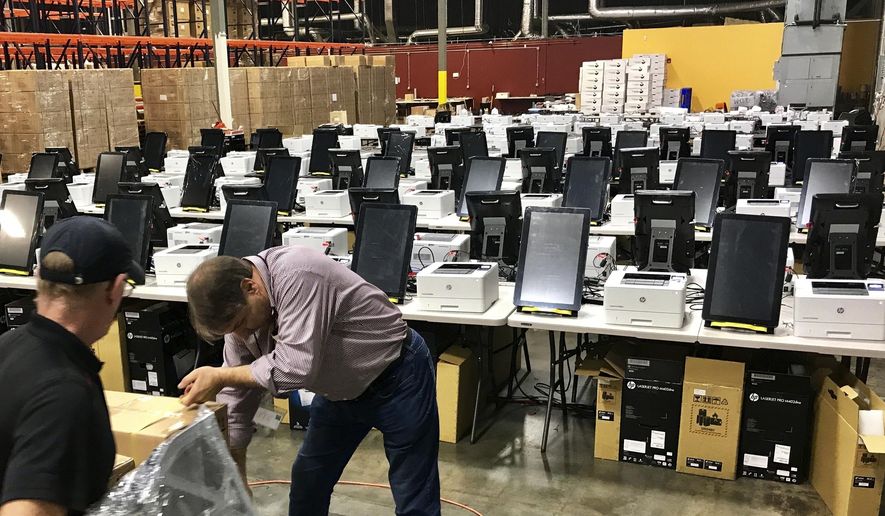ATLANTA — In defending itself against a defamation lawsuit filed by Dominion Voting Systems, Fox News is seeking access to an expert report filed under seal in a separate Georgia lawsuit that the author says details vulnerabilities in the company’s touchscreen voting machines.
Election security expert J. Alex Halderman spent 12 weeks examining the voting machines used in Georgia and more than a dozen other states and said he identified “multiple severe security flaws” in the machines that would allow attackers to install malicious software. His report was filed in federal court in Atlanta in July in support of a long-running lawsuit filed by election security advocates and voters who want Georgia to scrap the electronic voting machines in favor of hand-marked paper ballots.
Dominion in March filed a $1.6 billion defamation lawsuit against Fox News in Delaware, where both companies are incorporated, arguing the cable news giant falsely claimed that the voting company had rigged the 2020 election. A judge last month rejected Fox’s motion to dismiss the suit. The lawsuit cites Halderman, saying he “told Fox explicitly, ‘There is absolutely no evidence, none, that Dominion Voting Machines changed any votes in this election.’”
A voting technology specialist and director of the University of Michigan’s Center for Computer Security and Society, Halderman is an expert witness in the Georgia case and his report was filed under seal and designated “attorneys’ eyes only,” making it off limits even to the actual parties to the Georgia lawsuit. Only their lawyers and experts could see it.
Now, Fox News is asking to see Halderman’s report, writing in a motion filed in federal court in Atlanta Wednesday that, among other things, it wants to “determine the extent to which it contradicts his purported statement” to Fox News. The motion asks U.S. District Judge Amy Totenberg to allow six lawyers and consulting experts for Fox to have access to the report and says they would abide by the confidentiality requirements in the court’s protective order.
Halderman, who is an ardent supporter of hand-marked paper ballots, has said in declarations filed with the court that his mission as an expert witness in the Georgia case was not to show any malicious activity in past elections but rather to determine whether the machines have security flaws. He said in an interview with The Associated Press last year that he had seen no evidence the vulnerabilities were exploited to change the outcome of the 2020 election.
Halderman has said the information in his report should be made public so that officials in places that use the equipment can work to mitigate the problems. To that end, he created a version of the report that is redacted to exclude specific portions that show how hacks could be carried out, lawyers said during a November hearing in the Georgia case.
Lawyers for the Coalition for Good Governance, a plaintiff in the case, asked during the hearing for permission to share the redacted report with the organization’s executive director, but Totenberg said she wasn’t prepared at the time to address that.
She has so far expressed an unwillingness to make the report public, saying during the November hearing that the information isn’t to be disseminated to just anyone “who somehow has some interest in it.” She did say she wouldn’t object to the report being shared with Dominion.
Dominion did not immediately respond Thursday to an email asking if the company or its attorneys had seen the report or had its contents explained to them. The Georgia secretary of state’s office declined to respond when asked whether anyone in that office had seen or asked to see the report.
Louisiana uses the Dominion system in question for early voting. The secretary of state there last month filed a motion asking Totenberg for access to the report “for purpose of discovering unknown potential vulnerabilities and taking the requisite mitigation measures and procedural steps to address any potential security flaws” in the system.
In a filing opposing that access, lawyers for the state argued that Halderman was given access to Georgia’s voting system for the purpose of the lawsuit, not so that he could provide reports to “various governmental entities and other individuals.” They wrote that the report “contains sensitive, non-public information about Georgia’s voting system.”
Totenberg on Monday rejected the Louisiana secretary of state’s request, writing that she “remains concerned about the risks associated with further dissemination of the report.” She worried that if she granted access to the Louisiana secretary of state, it could “open the floodgates” to similar requests from others, “which would also increase the the potential for hacking and misuse of sensitive, confidential election system information.”




Please read our comment policy before commenting.